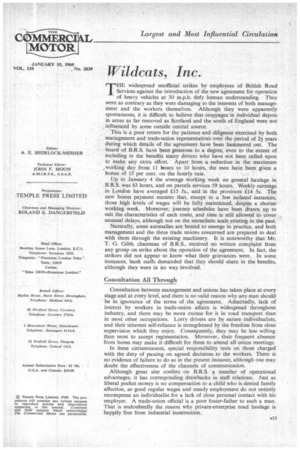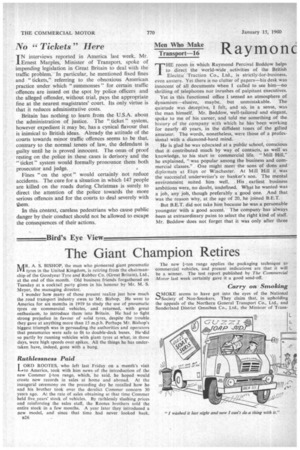Wildcats, Inc.
Page 31

Page 32

If you've noticed an error in this article please click here to report it so we can fix it.
THE widespread unofficial strikes by employees of British Road Services against the introduction of the new agreement for operation of heavy vehicles at 30 m.p.h. defy human understanding. They were as contrary as they were damaging to the interests of both management and the workers themselves. Although they were apparently spontaneous, it is difficult to believe that stoppages in individual depots in areas as far removed as Scotland and the south of -England were not influenced by some outside central source.
This is a poor return for the patience and diligence exercised by both management and trade-union-representativeS over the period of 24years during which details of the agreement have been hammered out. The board of B.R.S. have been generous to a degree, even to the extent of including in the benefits many drivers who have not been called upon to make any extra effort. Apart from a reduction in the maximum ,working day from 11 lours to 10 hours, the men have been given a bonus of 15 per cent. on the hourly rate.
Up to January 4 the average working week on general haulage in B.R.S. was 63 hours, and on parcels services 59 hours. Weekly earnings in London have averaged £15 5s., and in the provinces £14 5s. The new bonus payment ensures that, except in a few isolated instances, those high levels of wages will be fully maintained, despite a shorter working week. Moreover, journey schedules have been drawn up to suit the characteristics of each route, and time is still allowed to cover unusual delays, although not on the unrealistic scale existing in the past.
Naturally, some anomalies are bound to emerge in practice, and both management and the three trade unions concerned are prepared to deal with them through the existing machinery. It is noteworthy that Mr. T. G. Gibb, chairman of B.R.S., received no written complaint from any group on strike about the operation of the agreement. In fact, the strikers did not appear to know what their grievances were. In some instances, bank staffs demanded that they should share in the benefits, although they were in no way involved.
Consultation All Through
Consultation between management and unions has taken place at every stage and at every level, and there is no valid reason why any man should be in ignorance of the terms of the agreement. Admittedly, lack of interest by workers in trade-union affairs is widespread throughout industry, and there may be more excuse for it in road transport than in most other occupations. Lorry drivers are by nature individualists, and their inherent self-reliance is strengthened by the freedom from close supervision which they enjoy. Consequently, they may be less willing than most to accept regimentation. Moreover, their frequent absence from home may make it difficult for them to attend all union meetings.
In these circumstances, special responsibility rests on those charged with the duty of passing on agreed decisions to the workers. There is no evidence of failure to do so in the present instance, although one may doubt the effectiveness of the channels of communication.
Although great size confers on B.R.S. a number of operational advantages, it has corresponding drawbacks in staff relations. Just as liberal pocket money is no compensation to a child who is denied family affection, so good regular wages and steady employment do not entirely recompense an individualist for a lack of close personal contact with his employer. A trade-union official is a poor foster-father to such a man. That is undoubtedly the reason why private-enterprise road haulage is happily free from industrial insurrection.
No "Tickets" Here
IN interviews reported in America last week, Mr. Ernest Marples, Minister of Transport, spoke of impending legislation in Great Britain to deal with the traffic problem. In particular, he mentioned fixed fines and "tickets," referring to the obnoxious American practice under which " summonses " for certain traffic offences are issued on the spot by police officers and the alleged offender, without trial, pays the appropriate fine at the nearest magistrates' court. Its only virtue is that it reduces administrative costs.
Britain has nothing to learn from the U.S.A. about the administration of justice. The " ticket " system, however expedient it may be, has a cynical flavour that is inimical to British ideas. Already the attitude of the courts towards minor traffic offences seems to be that, contrary to the normal tenets of law, the defendant is guilty until he is proved innocent. The onus of proof resting on the police in these cases is derisory and the " ticket " system would formally pronounce them both prosecutor and judge.
Fines "on the spot" would certainly not reduce accidents. The cure for a situation in which 147 people are killed on the roads during Christmas is surely to direct the attention of the police towards the more serious offences and for the courts to deal severely with them.
In this context, careless pedestrians who cause public danger by their conduct should not be allowed to escape the consequences of their actions.












































































































